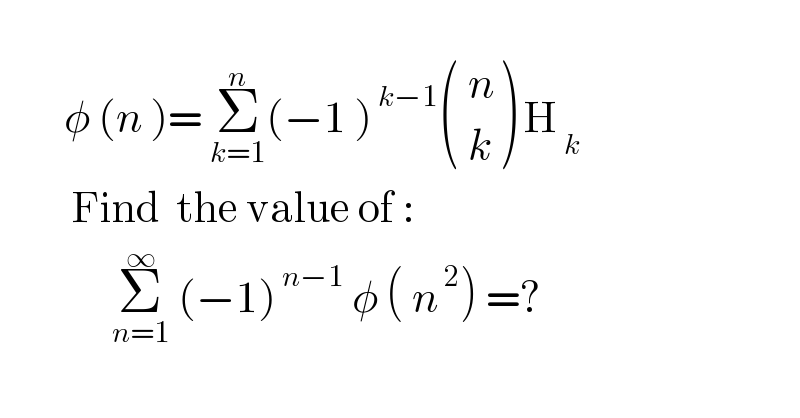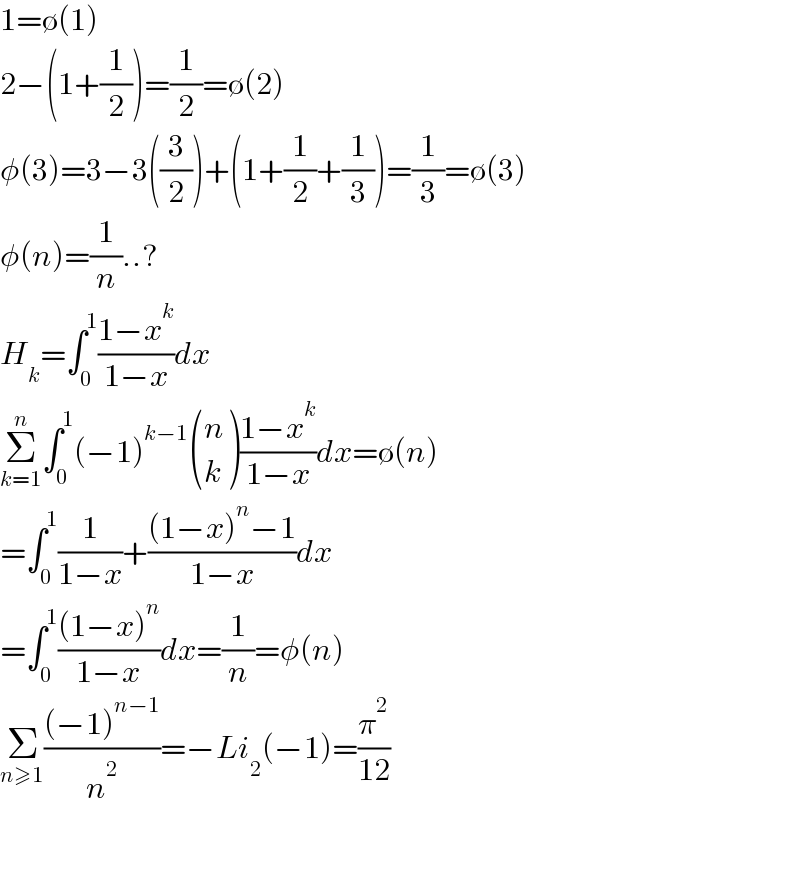
Question Number 156386 by mnjuly1970 last updated on 10/Oct/21

$$ \\ $$$$\:\:\:\:\:\:\:\:\phi\:\left({n}\:\right)=\:\underset{{k}=\mathrm{1}} {\overset{{n}} {\sum}}\left(−\mathrm{1}\:\right)^{\:{k}−\mathrm{1}} \begin{pmatrix}{\:{n}}\\{\:{k}}\end{pmatrix}\:\mathrm{H}_{\:{k}} \\ $$$$\:\:\:\:\:\:\:\:\:\mathrm{Find}\:\:\mathrm{the}\:\mathrm{value}\:\mathrm{of}\:: \\ $$$$\:\:\:\:\:\:\:\:\:\:\:\:\:\:\underset{{n}=\mathrm{1}} {\overset{\infty} {\sum}}\:\left(−\mathrm{1}\right)^{\:{n}−\mathrm{1}} \:\phi\:\left(\:{n}^{\:\mathrm{2}} \right)\:=? \\ $$
Answered by mindispower last updated on 10/Oct/21

$$\mathrm{1}=\emptyset\left(\mathrm{1}\right) \\ $$$$\mathrm{2}−\left(\mathrm{1}+\frac{\mathrm{1}}{\mathrm{2}}\right)=\frac{\mathrm{1}}{\mathrm{2}}=\emptyset\left(\mathrm{2}\right) \\ $$$$\phi\left(\mathrm{3}\right)=\mathrm{3}−\mathrm{3}\left(\frac{\mathrm{3}}{\mathrm{2}}\right)+\left(\mathrm{1}+\frac{\mathrm{1}}{\mathrm{2}}+\frac{\mathrm{1}}{\mathrm{3}}\right)=\frac{\mathrm{1}}{\mathrm{3}}=\emptyset\left(\mathrm{3}\right) \\ $$$$\phi\left({n}\right)=\frac{\mathrm{1}}{{n}}..? \\ $$$${H}_{{k}} =\int_{\mathrm{0}} ^{\mathrm{1}} \frac{\mathrm{1}−{x}^{{k}} }{\mathrm{1}−{x}}{dx} \\ $$$$\underset{{k}=\mathrm{1}} {\overset{{n}} {\sum}}\int_{\mathrm{0}} ^{\mathrm{1}} \left(−\mathrm{1}\right)^{{k}−\mathrm{1}} \begin{pmatrix}{{n}}\\{{k}}\end{pmatrix}\frac{\mathrm{1}−{x}^{{k}} }{\mathrm{1}−{x}}{dx}=\emptyset\left({n}\right) \\ $$$$=\int_{\mathrm{0}} ^{\mathrm{1}} \frac{\mathrm{1}}{\mathrm{1}−{x}}+\frac{\left(\mathrm{1}−{x}\right)^{{n}} −\mathrm{1}}{\mathrm{1}−{x}}{dx} \\ $$$$=\int_{\mathrm{0}} ^{\mathrm{1}} \frac{\left(\mathrm{1}−{x}\right)^{{n}} }{\mathrm{1}−{x}}{dx}=\frac{\mathrm{1}}{{n}}=\phi\left({n}\right) \\ $$$$\underset{{n}\geqslant\mathrm{1}} {\sum}\frac{\left(−\mathrm{1}\right)^{{n}−\mathrm{1}} }{{n}^{\mathrm{2}} }=−{Li}_{\mathrm{2}} \left(−\mathrm{1}\right)=\frac{\pi^{\mathrm{2}} }{\mathrm{12}} \\ $$$$ \\ $$$$ \\ $$
Commented by mnjuly1970 last updated on 10/Oct/21

$$\:\:{very}\:{nice}\:..{excellent}\:..{thank}\:{you} \\ $$$${so}\:{much}\:\:{sir}\:{power} \\ $$
Commented by mindispower last updated on 10/Oct/21

$${withe}\:{pleasur}\:{sir} \\ $$
